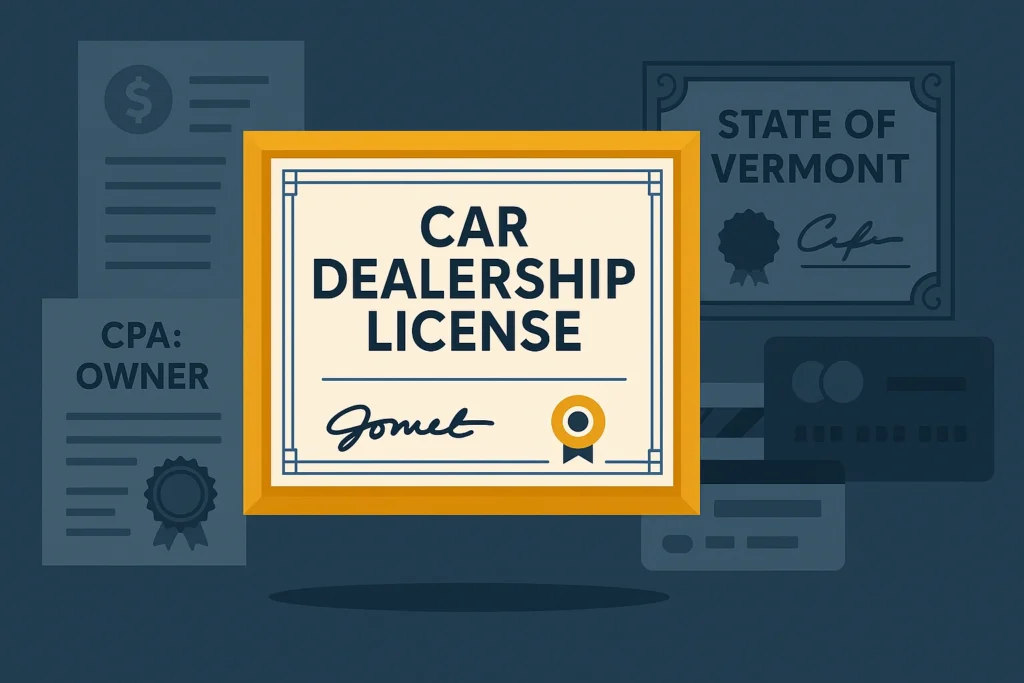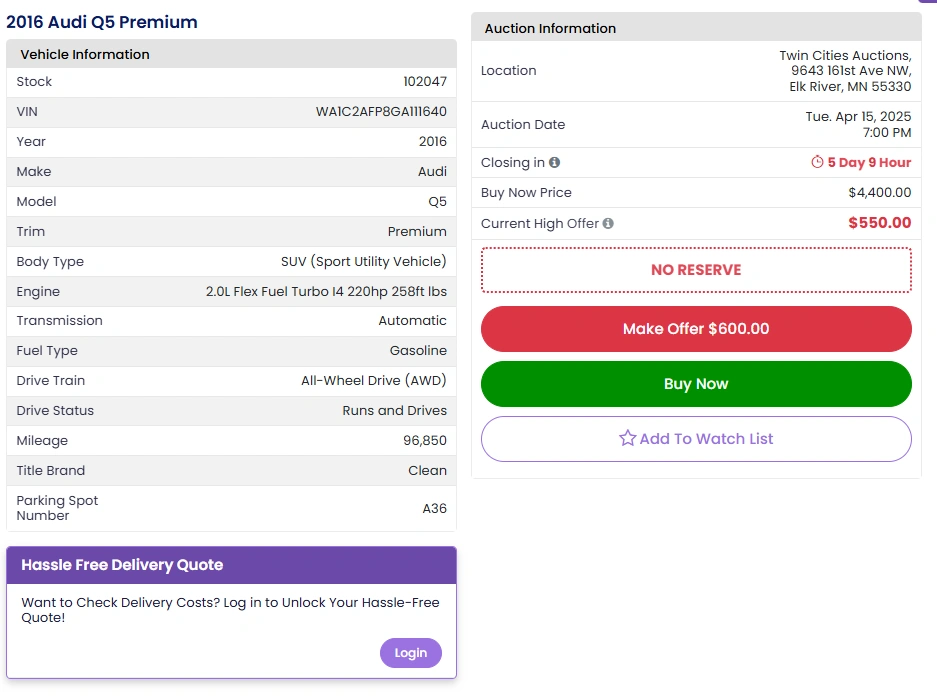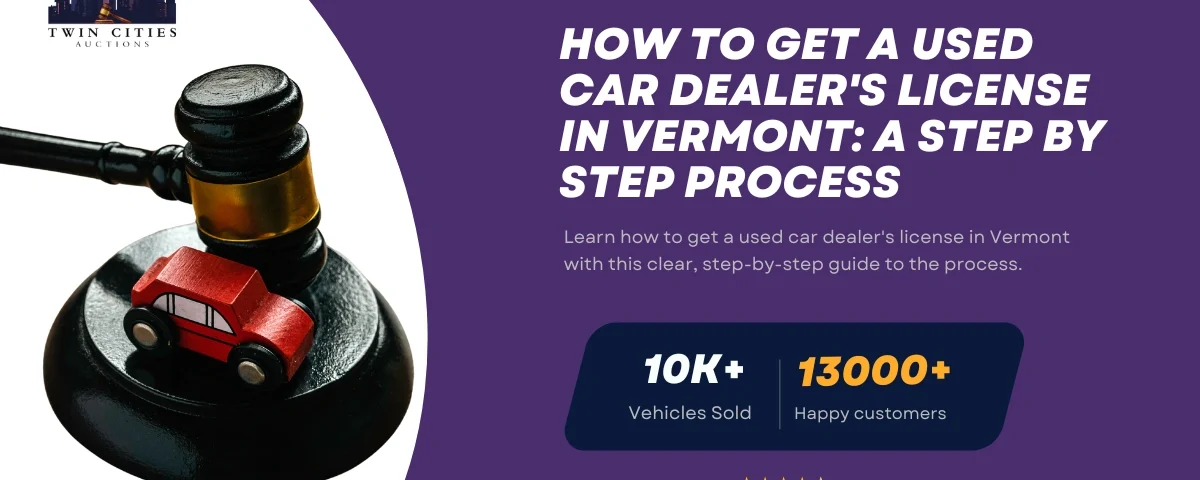Starting your own used car dealership in Vermont can be a rewarding and profitable venture. However, before you can start selling vehicles, it’s crucial to ensure that you’re fully licensed and operating legally.
The process of obtaining a used car dealer’s license in Vermont involves several steps and a thorough understanding of the state’s licensing requirements.
In this guide, we will walk you through the process, explain the different types of dealer licenses, and show you how auto auctions like Twin Cities Auctions can be an excellent resource for stocking your dealership.

Key Takeaways
- In Vermont, you can sell up to 11 vehicles per year without a dealer’s license. Once you exceed this, you need to obtain a used car dealer’s license.
- Different types of dealer licenses exist in Vermont, including Used Car Dealer, Wholesale Dealer, and Auction Dealer Licenses.
- The process for obtaining a dealer’s license includes completing the application, submitting required documents, passing a dealer exam, and paying the necessary fees.
- Auctions like Twin Cities Auctions offer an effective way to source vehicles at competitive prices for your dealership.
Step-by-Step Process to Obtain a Used Car Dealer’s License in Vermont
Becoming a licensed used car dealer in Vermont requires you to follow a specific process. Below, we outline the necessary steps to apply for and secure your license.
Step 1: Choose the Right Type of License
In Vermont, you must first determine which type of dealer’s license you need. The most common types include:
| License Type | Description |
| New Car Dealer License (NCD) | Allows the sale of new vehicles and requires a valid sales and service agreement with a manufacturer. |
| Used Car Dealer License (UCD) | Permits the sale of used vehicles. This is the most common license for those looking to sell used cars to consumers. |
| Wholesale Dealer License | Enables the sale of vehicles exclusively to other licensed dealers, not to the public. |
| Auction Dealer License | Authorizes the operation of a vehicle auction business. |
| Finance Car Dealer License | Allows the financing of vehicle sales, a great option for those who want to offer in-house financing to buyers. |
For most individuals looking to sell used cars to the public, the Used Car Dealer License (UCD) will be the necessary choice.
Step 2: Meet the Basic Requirements
Before applying for your used car dealer’s license, ensure that you meet the following basic requirements:
| Requirement | Description |
| Business Location | You must have a physical location for your dealership that complies with local zoning laws. |
| Business Entity | You must form a legal business entity such as a corporation, LLC, or sole proprietorship. |
| Surety Bond | A surety bond is required for all used car dealers in Vermont, providing financial protection for consumers. |
| Criminal Background Check | Applicants must pass a criminal background check. Convictions related to fraud or dishonesty may disqualify you. |
Step 3: Complete the Dealer License Application
Once you meet the requirements, the next step is to complete the Dealer License Application. You can find the application form on the Vermont Department of Motor Vehicles (DMV) website. The application asks for detailed information about your business, such as:
- Your business name and address
- Proof of your business entity (LLC, corporation, etc.)
- Evidence that your location complies with local zoning laws
- Information about your business partners, if applicable
Step 4: Submit Required Documents
Along with the application form, you’ll need to submit several documents to support your application, including:
- Proof of your business location
- Your surety bond
- Criminal background check results
- A copy of your business registration
Once submitted, the Vermont DMV will review your application. If everything is in order, you will be notified of the next steps.
Step 5: Pass the Dealer Exam
To ensure that you are familiar with Vermont’s motor vehicle laws, you must pass a Dealer Exam. The exam will test your knowledge on topics such as:
- Vehicle titles
- Consumer protection laws
- Warranties and disclosures
- Marketing and advertising rules
The Vermont DMV provides study materials to help you prepare for the exam. Passing the exam is a crucial step in obtaining your dealer’s license.
Step 6: Maintain Compliance with Dealer Laws
Once you obtain your used car dealer’s license, it’s essential to stay compliant with Vermont’s dealer laws and regulations. This includes:
- Record Keeping: Maintain accurate records of all transactions, including vehicle sales, title transfers, and customer contracts.
- Advertising Compliance: Ensure that all advertisements comply with state laws and include necessary disclosures.
- Regular Renewals: Dealer licenses are valid for a specific period, usually one year, and must be renewed annually. Keep track of renewal deadlines and submit any necessary documentation.
Step 7: Pay Fees and Obtain Your License
After passing the dealer exam, you will need to pay the necessary application and licensing fees. The fees vary depending on the type of license you are applying for, and you can find the latest fee schedule on the Vermont DMV website. After paying the fees and receiving approval, you will be issued your used car dealer’s license.
Why Auctions Are a Smart Choice for Vehicle Sales
When you’re building your inventory, using auctions can be a smart choice for sourcing vehicles. Twin Cities Auctions, based in Minnesota, is one such reputable auction house that offers a wide range of vehicles at competitive prices.
Key Benefits of Buying from Auctions:
- Wide Selection: Auctions like Twin Cities Auctions offer a variety of vehicles, from low-budget cars to high-end models.

- Competitive Pricing: Auctions often offer vehicles at prices below retail value, enabling dealers to maximize their profit margins.

- Transparency: Auctions provide full vehicle history reports, so you know exactly what you’re buying.

- Convenient Bidding: Many auctions offer online bidding for your convenience, making it easier to source vehicles without being physically present.
Twin Cities Auctions: A Smart Vehicle Sourcing Choice
For those in the automotive industry, Twin Cities Auctions offers an excellent platform for sourcing quality vehicles at competitive prices.
Whether you are just starting or expanding your business, this auction house provides transparency, competitive pricing, and a broad selection.
| Feature | Description |
| Inventory Variety | Wide range of cars, trucks, and SUVs available |
| Competitive Pricing | Below-market pricing allows for higher profit margins |
| Vehicle History Reports | Detailed history reports for every vehicle |
| Online Bidding | Convenient online bidding options for dealers |
| Financing Options | Financing available to help with inventory purchases |
Practical Tips for Sellers and Dealers
In addition to obtaining your license and sourcing inventory, there are other strategies that can help ensure the success of your dealership.
Know Your Market
Understanding the needs of your local customer base is key. Research popular makes and models, fuel efficiency, and customer preferences. For instance, in some areas, family sedans or SUVs may be in high demand, while in others, smaller, more affordable vehicles may sell better.
Offer Financing Options
Many customers are looking for financing when buying a car. Offering financing options through a bank, credit union, or even in-house financing can significantly boost your sales.
Build a Strong Online Presence
A professional website, active social media profiles, and online listings can help your dealership gain visibility and attract more customers. Consider implementing digital marketing strategies like pay-per-click ads, SEO, and email marketing.
Conclusion
Getting a used car dealer’s license in Vermont is a critical step to legally operate a car dealership. By following the outlined steps and obtaining the right type of license, you’ll be able to start your business with confidence. Additionally, sourcing your inventory through auto auctions like Twin Cities Auctions ensures you’ll have access to a wide variety of vehicles at competitive prices, helping your dealership thrive in a competitive market.
Your Next Car is Just a Click Away at Twin Cities Auctions!
Twin Cities Auctions brings the excitement of car auctions directly to your screen. No dealer license? No problem! Our online platform is open to the public, offering a wide range of vehicles to suit all tastes and budgets.
Whether you are an automotive enthusiast or a first-time buyer, you’ll find an impressive variety of vehicles that cater to all tastes and budgets. From reliable family sedans and eco-friendly hybrids to high-performance cars and premium SUVs, our listings are curated to ensure quality and diversity.
Enjoy a hassle-free bidding process and secure your perfect match from our extensive lineup. Don’t miss out—your next car is just a click away at Twin Cities Auctions!
Looking for more options? Explore our comprehensive list of all available car auctions across the United States. Your next deal might be just a click away!
FAQ
What is the maximum number of vehicles you can sell without a dealer’s license in Vermont?
You can sell up to 11 vehicles in a year without needing a dealer’s license. If you sell 12 or more vehicles annually, you are required to obtain a used car dealer’s license.
How much does a used car dealer’s license cost in Vermont?
The cost varies depending on the type of license and other factors. It is best to check with the Vermont DMV for current fees.
Do I need a physical location to sell cars in Vermont?
Yes, your business must have a physical location that complies with local zoning laws. The location must be dedicated to vehicle sales.
How do I prepare for the Vermont dealer exam?
Study the Vermont DMV’s guidelines, focusing on topics like vehicle titles, warranties, consumer protection, and the state’s motor vehicle laws.
What is a surety bond, and do I need one?
A surety bond is a financial guarantee that protects consumers in case the dealership fails to meet its obligations. Yes, you will need to secure one to operate as a dealer.
Can I sell cars without a license at an auction in Vermont?
No, a dealer’s license is required to buy or sell vehicles at an auction in Vermont.
What are the business location requirements for a used car dealership?
Your dealership must comply with local zoning laws and provide proof of a valid, dedicated location for car sales.
Why should I use auto auctions to source vehicles?
Auto auctions allow you to buy vehicles at lower prices, providing a broad range of options and the ability to purchase multiple cars at once to build your inventory quickly.
Source Links
https://dmv.vermont.gov/registrations/dealers
https://dmv.vermont.gov/enforcement-and-safety/dealer-services
https://dmv.vermont.gov/enforcement-and-safety/dealer-services/dealer-registration-guide
https://dmv.vermont.gov/sites/dmv/files/documents/VD-114-Motor_Vehicle_Dealer_Bond.pdf
https://dmv.vermont.gov/enforcement-and-safety/dealer-services/dealer-renewal
https://dmv.vermont.gov/enforcement-and-safety/overview/tips-for-buying-a-used-vehicle


